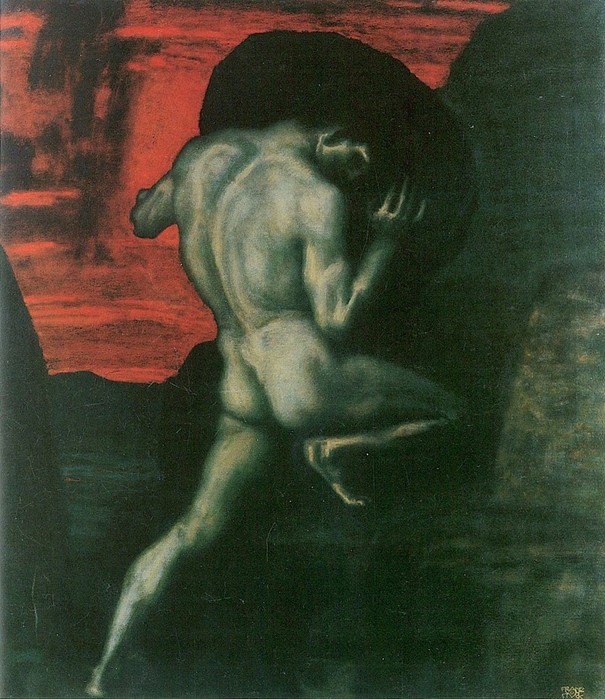Thank you, Gaurav Sharma, for this great question. I assume you are referring to Albert Camus’ interpretation of the Sisyphus myth, and I highly encourage you to dig into the core text because it is brilliant. Camus’ main message is that we must imagine Sisyphus happy to be able to accept the absurdity of our own lives. But I believe there are more reasons why we can imagine Sisyphus happy, and not only momentarily, even if the circumstances of his afterlife are usually painted as a grim picture of endless suffering.
The famous punishment he received can be considered an ideal of hell – an endless effort put into a task that can never be completed. We can almost feel the pain that results from knowing that all his hard work is for nothing. We can almost see the despair on his face coming from the unfulfilled desire to bring the work to a close. This permanent lack of achievement and perpetual failure is what Sisyphus experiences when he heaves a boulder of enormous weight near to the top of a mountain. Whenever he comes close to the summit, the boulder falls back to the bottom. Sisyphus has no choice but to try to do it again, knowing that his efforts can only bring him more suffering. At least this is how his punishment is usually interpreted and why Camus views this myth as a reflection of a miserable and absurd life. But can we imagine, even in these terrible conditions, at least three reasons for him to be happy?
First of all, during his life Sisyphus was an outstandingly smart and skilful person. After all, he managed to trick death twice, made a fool of Zeus, and even outsmarted his own wife. He was also a king and, according to Homer, the craftiest of men. In his afterlife he was given a task that cannot be overcome by trickery, craft, or forethought. The simplicity of the task he was given must have brought him some peace of mind. This mind that during life did nothing but try to outsmart others was given a responsibility that is immune to thought. This surely brought some peace of mind to his restless thinking.
Secondly, Sisyphus’s task is repetitive and predictable. He knows perfectly well what tomorrow brings. There is no surprise awaiting him, no fear of the unknown, no anxiety of what the future might bring. He knows that nothing worse can happen. There is security, certainty, and predictability. There is a knowledge of his own fate. Sisyphus owns an absolute knowledge of himself. This is something that many mortals would often prefer: infinite certainty may be better than the fear brought by our own finitude. The endless hard work is the foundation of his self-knowledge.
Thirdly, the afterlife is endless, and therefore there is no pressure to achieve. Infinity from its definition suggests that absolutely nothing can ever be brought to closure. In the state of infinity, does Sisyphus fail in his job? How is his never-ending task different to any other never-ending afterlives? Again, defining success through completion is something that us mortals tend to do. Our finitude forces us to bring things to closure. But in the afterlife, everything is endless. Sisyphus’s task is endless, but so is Zeus’s, and so are those of all other infinite beings that reside in heaven.
We do not have to imagine Sisyphus as a man that absolutely hates his job. I think we can find a moral in this myth that teaches us that peace can be found in knowing your work. I can see Sisyphus smiling when he yet again stands at the bottom of the mountain.
What do you think? If you were in Sisyphus’s place, could you be happy? Let us know in the comments.
If you have a question for the Armchair Philosophers, don’t hesitate to get in touch. You can find us on Twitter (@armchair_o) or fill in this form.
Be sure to check out our podcast!
If you like what we do, you can support us by buying us a coffee! Image: Sisyphus, by Franz Stuck (1920)
I am a PhD candidate in Political and Social Thought at the University of Kent, Canterbury. I am researching modern Western cosmologies and approaches to organicism. My interests lie in the area of continental political thought, process ontologies and the philosophy of technology. My favourite philosophers are A.N. Whitehead and F.W.J. Schelling, whom I admire for their organic systematizations of nature and natural knowledge.


A jarring passage of Camus’. Probably meant as such. Finding not just sympathy for one of the anti-heroes of the classics, but… admiration.
I know full well the beauty of simplicity of futile labours. Like the mandala’s of Tibet, purpose is found in the work; not the results. But the application of such an idea, to validate pointless labours, useless work for thankless taskmasters, tangent the tenets of capitalist propaganda too close for comfort. “Find satisfaction in never ending tedium and you’ll never work a day in your life” sounds like a too-close-to-home parody of a soul-sucking motivational poster for me to be okay with it.
100% agree with the soul-sucking!!
The points raised in the article about “surely Sisyphus finds comfort in pointless monotony”…. as a Government worker of over 30 years with (what I hope is) an intelligent mind, I would strongly suggest this aspect is actually more of a punishment for Sisyphus than the task itself!
A fate designed to completely deprive an individual of career aspirations, ingenuity and inventiveness…… given his history, Sisyphus could never be happy
I don’t think that work or labor as we understand it now is the same as what it meant in this moral, work is a symbol of service, service to others, having a task you dedicate your time too and excel in, shapes all of your life and helps you indirectly structure your own brain and things start to fall into their places.
Each person’s case is different some might relate to Sisyphus others may not, Sisyphus has a hectic life full of action, manipulation and survival, him being in a different environment in the afterlife, might symbolize that he finally got what he needed and understood that all the resistance and trickery that he experienced did not result in peace of mind.
*(Humble opinion)
[…] and foremost, it is not Sisyphus that says he’s happy. It is wellness motivational speakers, armchair philosophers, French socialist absurdists, and pray – PRAY – that our corporate overlords never get wind of […]
Camus preaching Stockholm Syndrome.
RAHHHHHH